<< Previous | Displaying results 5051-5075 of 6769 for "" | Next >>
In front of the German consulate building, writers demonstrate against Nazi book burnings. New York, United States, May 10, 1938.
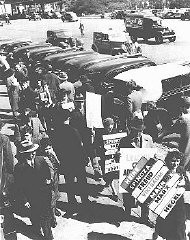
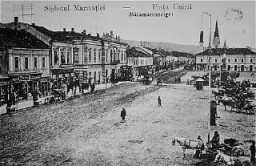
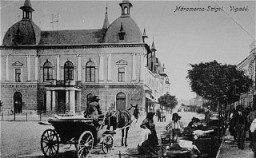
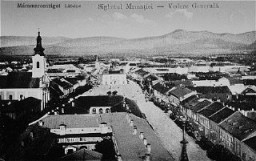
Leaders of the Sighet Jewish community. Those pictured include Mr. Hershkovich (seated far left), Mr. Klein (seated second from left), Mr. Yacobovich (standing far right), and Mr. Jahan (standing second row, right). Photograph taken ca. 1928–1930.
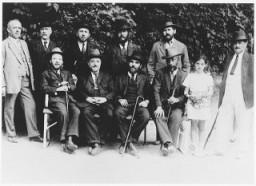
Prewar group portrait in front of a synagogue in the Transylvanian town of Sighet.
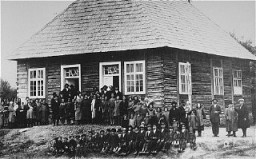
Jews bound for the rail station during deportation action from Sighet. May 18, 1944.
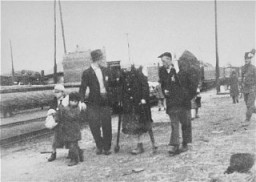
View of the burned-out Malbish Arimim synagogue on Teglash Street in Sighet. This photograph was taken after the deportation of the Jewish population. May 1944.
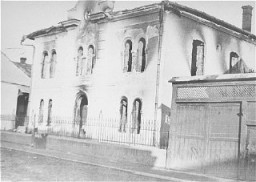
Escorted by US soldiers, child survivors of the Buchenwald concentration camp file out of the main gate of the camp. Buchenwald, Germany, April 27, 1945.
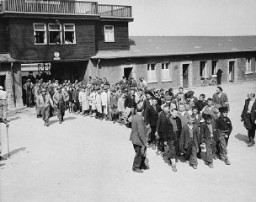
Children march out of Buchenwald to a nearby American field hospital where they will receive medical care. Buchenwald, Germany, April 27, 1945.
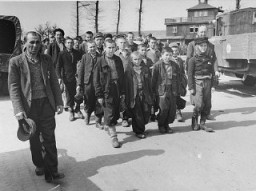
Group portrait of Jewish displaced youth at the OSE (Oeuvre de Secours aux Enfants) home for Orthodox Jewish children in Ambloy. Elie Wiesel is among those pictured. Ambloy, France, 1945.
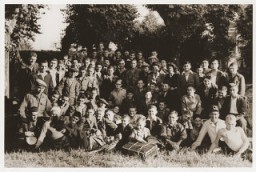
Vladka Meed shakes the hand of President Jimmy Carter at a White House Rose Garden ceremony. The ceremony marked the official presentation of the report of the US Holocaust Commission to the president by commission chairman Elie Wiesel (second from right, with Benjamin Meed, center). Washington, DC, September 27, 1979.
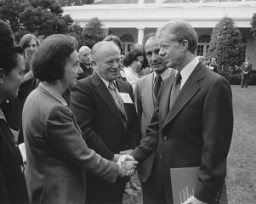
Elie Wiesel speaks at the Faith in Humankind conference, held before the opening of the United States Holocaust Memorial Museum, on September 18–19, 1984, in Washington, DC.
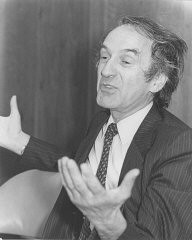
Elie Wiesel (right) with his wife and son during the Faith in Humankind conference, held several years before the opening of the United States Holocaust Memorial Museum. September 18–19, 1984, in Washington, DC.
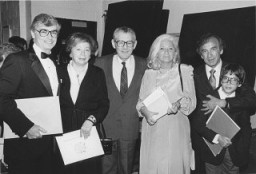
Elie Wiesel speaks at the Faith in Humankind conference, held several years before the opening of the United States Holocaust Memorial Museum. September 18–19, 1984, in Washington, DC.
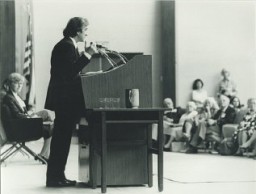
President Bill Clinton (center), Elie Wiesel (right), and Harvey Meyerhoff (left) light the eternal flame outside on the Eisenhower Plaza during the dedication ceremony of the United States Holocaust Memorial Museum. April 22, 1993.
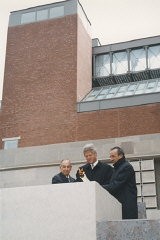
This photograph shows Auschwitz fence posts and a quote from Elie Wiesel's Night . They are on display in the third floor tower room of the Permanent Exhibition at the United States Holocaust Memorial Museum. "Never shall I forget that night, the first night in camp, which has turned my life into one long night, seven times cursed and seven times sealed. Never shall I forget that smoke. Never shall I forget the little faces of the children, whose bodies I saw turned into wreaths of smoke beneath a silent…
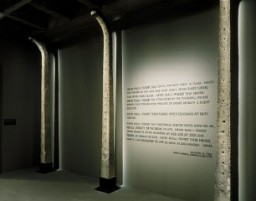
Elie Wiesel speaks at the Days of Remembrance ceremony, Washington, DC, 2001.
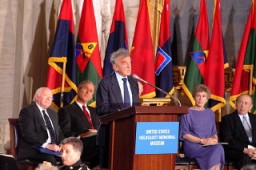
Elie Wiesel speaks at the Days of Remembrance ceremony, Washington, DC, 2002.
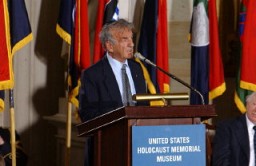
Elie Wiesel with President Ion Iliescu in Sighet following the presentation of the Final Report of the International Commission on the Holocaust in Romania.
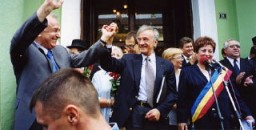
Elie Wiesel with his wife Marion and President Ion Iliescu in Sighet following the presentation of the Final Report of the International Commission on the Holocaust in Romania. Learn more about Romania facing its past.
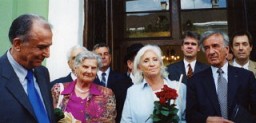
View of a camp for Soviet prisoners of war, showing the holes dug into the ground that served as shelter. The camp was located south of Hamburg in northern Germany. Wietzendorf, Germany, 1941–42.
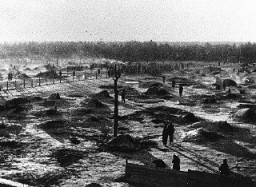
Soon after liberation, a US Army doctor examines an emaciated forced laborer, a Soviet prisoner of war. Dortmund, Germany, April 30, 1945.
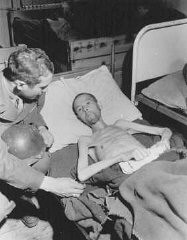
At left, a column of Soviet prisoners of war, under German guard, marches away from the front. Place uncertain, July 1, 1941.
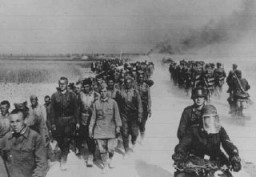
German soldiers guard Soviet prisoners of war marching to camps. Soviet Union, 1941. Second only to the Jews, Soviet prisoners of war were the largest group of victims of Nazi racial policy.
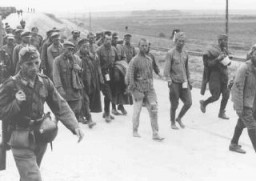
We would like to thank Crown Family Philanthropies, Abe and Ida Cooper Foundation, the Claims Conference, EVZ, and BMF for supporting the ongoing work to create content and resources for the Holocaust Encyclopedia. View the list of donor acknowledgement.